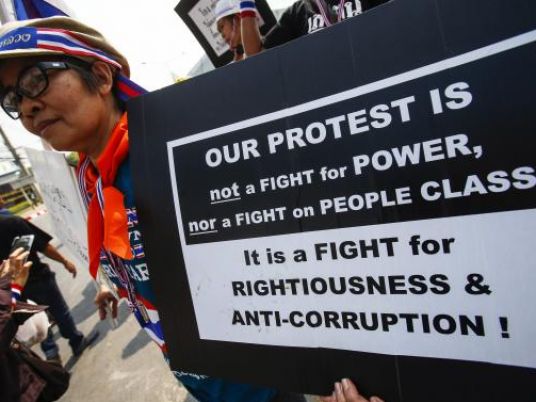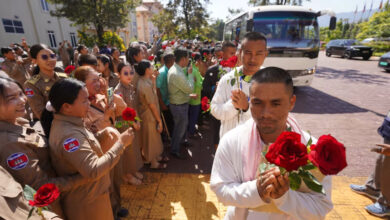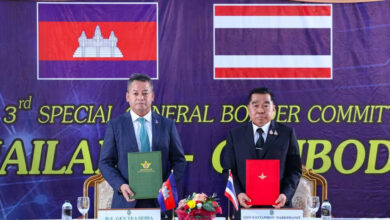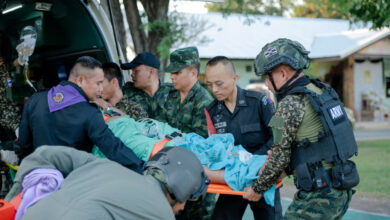
Thailand's Constitutional Court is almost certain to rule against Prime Minister Yingluck Shinawatra on abuse of power charges on Wednesday, forcing her from office and raising the possibility of fresh mass protests by her supporters.
That could lead to confrontation with anti-government groups which have been protesting in the capital, Bangkok, for six months in a bid to topple Yingluck. Those demonstrations disrupted a general election in February that she had been expected to win.
The crisis broadly pits Bangkok's middle class and royalist establishment against the mainly poor, rural supporters of Yingluck and her brother, ex-premier Thaksin Shinawatra, who was ousted by the military in 2006 and now lives in exile to avoid a jail term handed down in 2008 for abuse of power.
Yingluck's supporters accuse the court, which said it would issue its decision on Wednesday, of bias in frequently ruling against the government.
In 2008, the court forced two Thaksin-linked prime ministers from office. A similar ruling against Yingluck is expected on Wednesday.
Yingluck defended herself in court on Tuesday against a charge relating to her transfer of National Security Council chief Thawil Pliensri in 2011, which opponents say was designed to benefit her Puea Thai Party and a family member.
Yingluck, looking composed as she took the stand wearing a blue silk suit and a large pearl necklace, said a committee of ministers had made the decision to transfer the security chief.
"I did not interfere in the decision process … which should be for the benefit of the land," Yingluck told the court. "I have never benefited from any transfer of civil servants."
Some legal experts say her entire government will have to go if she is forced to step down, but her party rejects that.
She has led a caretaker administration with limited powers since dissolving parliament in December ahead of the election and her party says another interim prime minister can be chosen from among her five deputies.
"There is no reason why the whole cabinet should go with her," Noppadon Pattama, a legal adviser to Thaksin, told Reuters. "That would be like carrying out a double execution."
DECADE OF UNREST
Months of protests have undermined Yingluck's government, but she has clung on and the number of protesters has dwindled.
Tension, however, is rising again as she faces cases in courts criticized by her supporters as politicized.
Both her "red shirt" supporters and anti-government protesters plan large rallies in or around Bangkok in coming days.
That raised the possibility of new mass violence, like in 2010, when a government led by the current opposition leader ordered an army crackdown on Thaksin supporters after two months of protests. More than 90 died during those events.
"Tomorrow, red shirt leaders will gather at our Bangkok headquarters and will issue a statement after the verdict," said Thanawut Wichaidit, a spokesman for the group.
"Whether we bring forward our May 10 rally depends on the court ruling tomorrow. Let's wait and see."
Yingluck's ousting would be a new boost in tension in nearly a decade of confrontation between supporters of Thaksin and the Bangkok-based royalist establishment who see Thaksin, a former telecoms tycoon, as a threat to their interests and accuse him of corruption and nepotism.
Security chief Thawil was sidelined in 2011 when he was moved to an inactive post, nominally as adviser to the prime minister. He has argued that his transfer was to benefit the Shinawatras and their extended family.
He was replaced by then national police chief Wichien Podposri, whose position as police chief was later given to Priewpan Damapong, a brother-in-law of Thaksin.
Thawil was reinstated in March and the Constitutional Court then accepted there were grounds to hear an abuse of power case brought against the prime minister by 27 senators.
Yingluck also faces a charge of dereliction of duty over a state rice-buying scheme that critics say is riddled with corruption and has run up huge losses.
This charge was brought by the National Anti-Corruption Commission, which is expected to deliver its ruling this month. A guilty verdict here would also force Yingluck from office and she could in addition get a five-year ban from politics.
Efforts to end the political crisis have come to nothing.
A proposal by opposition leader Abhisit Vejjajiva for a six-month delay to a planned July general election to allow time for political and electoral reforms has been rejected by the Puea Thai Party and leaders of the anti-government movement.




